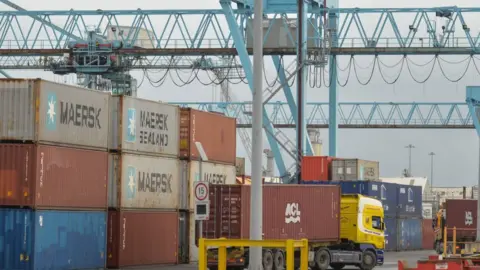Scottish government unveils 'green ports' plans
 Getty Images
Getty ImagesThe Scottish government has unveiled plans to adapt UK proposals for the establishment of free ports.
Scottish ministers said the "new model of green ports" would be focused on inclusive growth, fair work practices and delivering a net zero economy.
Free ports allow firms to import goods and then re-export them outside normal tax and customs rules.
The Scottish Conservatives said it was a "screeching U-turn" as the SNP have been critical of the free port plan.
The UK government is planning to create a number of free ports across the UK following Brexit, claiming they will act as "business and enterprise hubs", creating thousands of jobs.
The Scottish government, however, has voiced concern that they could lead to deregulation and a watering down of workers' rights.
Scottish trade minister Ivan McKee previously warned they could become "low wage, low value opportunities" - however, he insisted that would not be allowed to happen in Scotland.
Under the Scottish government's proposals, operators and businesses benefiting from the green port incentives would, among other things, have to pay the real living wage and "commit to supporting sustainable and inclusive growth in local communities".
Plans to create a free trade zone have previously been put forward for the Highlands' Cromarty Firth.
Rosyth, Dundee, Hunterston, Orkney and Aberdeen have also been suggested as possible sites.

What are free ports?
Also called free trade zones, they are designated areas where the normal tax and tariff rules of the country in which they are based do not apply.
They allow goods to be imported, manufactured and re-exported without being subject to checks, paperwork, or import taxes, known as tariffs.
This means raw materials can be imported, then engineered into whole products for export.
Typically, companies operating in the zone pay lower taxes, such as reduced VAT and lower rates of employment tax.
But critics argue they simply defer the point when import tariffs are paid, which then still need to be paid at some stage.

 Getty Images
Getty ImagesMr McKee, who will hold discussions on the proposals with the UK government next week, said: "The reputation of freeports across the world is mixed, with concerns about deregulation and risks of criminality, tax evasion and reductions in workers' rights raised.
"That is not a model nor an approach that this Scottish government will sign up to or allow here in Scotland.
"And it is clear that free ports cannot and will not undo the damage being caused to Scotland's economy by the UK government's decision to take us out of the EU, the world's biggest single market."
He added: "Instead, we propose to take the free port model and apply Scotland's priorities to it, so that it meets our ambition to deliver a net zero, wellbeing economy that upholds the highest standards of environmental protections and fair work practices and supports our strategy of building clusters of high productivity businesses across Scotland's regions."
'Humiliating climbdown'
Scottish Conservative economy spokesman Maurice Golden described it as a "humliating climbdown" for the SNP.
He said: "Just a few months ago, Ivan McKee was claiming that free ports are a 'shiny squirrel' and the SNP conference backed a motion slamming them.
"This screeching SNP U-turn is very welcome. It seems they have finally realised that businesses are desperate to reap the benefits from free ports.
"The Scottish Conservatives and UK government have said for months that the SNP should stop playing politics and start working constructively to take these proposals forward."
Scottish Labour's economy and jobs spokesman Alex Rowley said his party would work with the Scottish government to deliver "quality green jobs".
"We welcome the commitment to incentivise employers to pay the living wage, and the SNP government should extend this to all aspects of government - including the procurement of all public contracts," he said.
He added: "While we welcome this policy on pay, we need a strong commitment from ministers that they will work with trade unions and provide further guarantees that pursuing free ports will not lead to a race to the bottom on workers' terms and conditions.
'Greenwashing risk'
The Scottish Greens said rebranding free ports as green ports "could lead to a race to the bottom in environmental protections".
Environmental spokesman Mark Ruskell said: "Simply calling a free port 'green' doesn't guarantee environmental and workers standards, and presents a real risk of greenwashing a deregulated race to the bottom."
The Scottish Chambers of Commerce, however, welcomed the proposals.
Chief executive Liz Cameron said: "Whilst we await further detail from the government, it seems they have listened to the key asks from business including the provision of investment incentives and a package of tax and customs reliefs.
"Now, we will want to engage with government on the design and delivery of green ports in Scotland."
